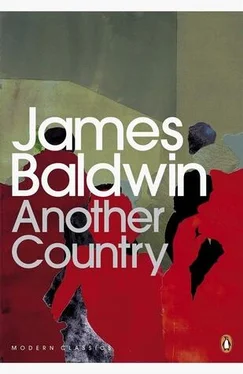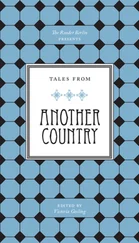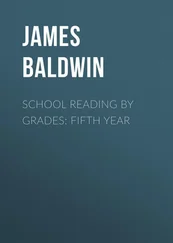James Baldwin - Another Country
Здесь есть возможность читать онлайн «James Baldwin - Another Country» весь текст электронной книги совершенно бесплатно (целиком полную версию без сокращений). В некоторых случаях можно слушать аудио, скачать через торрент в формате fb2 и присутствует краткое содержание. Год выпуска: 2001, Издательство: Penguin Books, Жанр: Современная проза, на английском языке. Описание произведения, (предисловие) а так же отзывы посетителей доступны на портале библиотеки ЛибКат.
- Название:Another Country
- Автор:
- Издательство:Penguin Books
- Жанр:
- Год:2001
- ISBN:нет данных
- Рейтинг книги:3 / 5. Голосов: 1
-
Избранное:Добавить в избранное
- Отзывы:
-
Ваша оценка:
- 60
- 1
- 2
- 3
- 4
- 5
Another Country: краткое содержание, описание и аннотация
Предлагаем к чтению аннотацию, описание, краткое содержание или предисловие (зависит от того, что написал сам автор книги «Another Country»). Если вы не нашли необходимую информацию о книге — напишите в комментариях, мы постараемся отыскать её.
is a novel of passions — sexual, racial, political, artistic — that is stunning for its emotional intensity and haunting sensuality, depicting men and women, blacks and whites, stripped of their masks of gender and race by love and hatred at the most elemental and sublime. In a small set of friends, Baldwin imbues the best and worst intentions of liberal America in the early 1970s.
Another Country — читать онлайн бесплатно полную книгу (весь текст) целиком
Ниже представлен текст книги, разбитый по страницам. Система сохранения места последней прочитанной страницы, позволяет с удобством читать онлайн бесплатно книгу «Another Country», без необходимости каждый раз заново искать на чём Вы остановились. Поставьте закладку, и сможете в любой момент перейти на страницу, на которой закончили чтение.
Интервал:
Закладка:
“Ida? Your coffee’s getting cold.”
“Thank you. I’ll be right out.”
He sat down on his work stool, and, presently, here she came, scrubbed and quiet, looking like a child. He forced himself to look into her eyes; he did not know what she would see in them; he did not know what he felt.
“Vivaldo,” she said, standing, speaking quickly, “I just want you to know that I wouldn’t have been with you so long, and wouldn’t have given you such a hard time, if”—she faltered, and held on with both hands to the back of a chair—“I didn’t love you. That’s why I had to tell you everything I’ve told you. I mean — I know I’m giving you a tough row to hoe.” She sat down, and picked up her coffee. “I had to say that while I could.”
She had the advantage of him, for he did not know what to say. He realized this with shame and fear. He wanted to say, I love you, but the words would not come. He wondered what her lips would taste like now, what her body would be like for him now: he watched her quiet face. She seemed utterly passive; yet, she was waiting, in a despair which steadily chilled and hardened, for some word, some touch, of his. And he could not find himself, could not summon or concentrate enough of himself to make any sign at all. He stared into his cup, noting that black coffee was not black, but deep brown. Not many things in the world were really black, not even the night, not even the mines. And the light was not white, either, even the palest light held within itself some hint of its origins, in fire. He thought to himself that he had at last got what he wanted, the truth out of Ida, or the true Ida; and he did not know how he was going to live with it.
He said, “Thank you for telling me — everything you’ve told me. I know it wasn’t easy.” She said nothing. She made a faint, steamy sound as she sipped her coffee, and this sound was unaccountably, inexpressibly annoying. “And forgive me, now, if I don’t seem to know just what to say, I’m maybe a little — stunned.” He looked over at her, and a wilderness of anger, pity, love, and contempt and lust all raged together in him. She, too, was a whore; how bitterly he had been betrayed! “I’m not trying to deny anything you’ve said, but just the same, there are a lot of things I didn’t — don’t — understand, not really. Bear with me, please give me a little time—”
“Vivaldo,” she said, wearily, “just one thing. I don’t want you to be understanding . I don’t want you to be kind, okay?” She looked directly at him, and an unnameable heat and tension flashed violently alive between them, as close to hatred as it was to love. She softened and reached out, and touched his hand. “Promise me that.”
“I promise you that,” he said. And then, furiously, “You seem to forget that I love you.”
They stared at each other. Suddenly, he reached out and pulled her to him, trembling, with tears starting up behind his eyes, burning and blinding, and covered her face with kisses, which seemed to freeze as they fell. She clung to him; with a sigh she buried her face in his chest. There was nothing erotic in it; they were like two weary children. And it was she who was comforting him. Her long fingers stroked his back, and he began, slowly, with a horrible, strangling sound, to weep, for she was stroking his innocence out of him.
By and by, he was still. He rose, and went to the bathroom and washed his face, and then sat down at his work table. She put on a record by Mahalia Jackson, In the Upper Room, and sat at the window, her hands in her lap, looking out over the sparkling streets. Much, much later, while he was still working and she slept, she turned in her sleep, and she called his name. He paused, waiting, staring at her, but she did not move again, or speak again. He rose, and walked to the window. The rain had ceased, in the black-blue sky a few stars were scattered, and the wind roughly jostled the clouds along.
2
The sun struck, on steel, on bronze, on stone, on glass, on the gray water far beneath them, on the turret tops and the flashing windshields of crawling cars, on the incredible highways, stretching and snarling and turning for mile upon mile upon mile, on the houses, square and high, low and gabled, and on their howling antennae, on the sparse, weak trees, and on those towers, in the distance, of the city of New York. The plane tilted, dropped and rose, and the whole earth slanted, now leaning against the windows of the plane, now dropping out of sight. The sky was a hot, blank blue, and the static light invested everything with its own lack of motion. Only things could be seen from here, the work of people’s hands: but the people did not exist. The plane rose up, up, as though loath to descend from this high tranquility; tilted, and Yves looked down, hoping to see the Statue of Liberty, though he had been warned that it could not be seen from here; then the plane began, like a stone, to drop, the water rushed up at them, the motors groaned, the wings trembled, resisting the awful, downward pull. Then, when the water was at their feet, the white strip of the landing flashed into place beneath them. The wheels struck the ground with a brief and heavy thud, and wires and lights and towers went screaming by. The hostess’ voice came over the speaker, congratulating them on their journey, and hoping to see them soon again. The hostess was very pretty, he had intermittently flirted with her all night, delighted to discover how easy this was. He was drunk and terribly weary, and filled with an excitement which was close to panic; in fact, he had burned his way to the outer edge of drunkenness and weariness, into a diamond-hard sobriety. With the voice of the hostess, the people of this planet sprang out of the ground, pushing trucks and waving arms and crossing roads and vanishing into, or erupting out of buildings. The voice of the hostess asked the passengers please to remain seated until the aircraft had come to a complete halt. Yves touched the package which contained the brandy and cigarettes he had bought in Shannon, and he folded his copies of France-Soir and Le Monde and Paris-Match, for he knew that Eric would like to see them. On the top of a brightly colored building, people were driven against the sky; he looked for Eric’s flaming hair, feeling another excitement, an excitement close to pain, well up in him. But the people were too far away, they were faceless still. He watched them move, but there was no movement which reminded him of Eric. Still, he knew that Eric was there, somewhere in that faceless crowd, waiting for him, and he was filled, all at once, with an extraordinary peace and happiness.
Then the plane came slowly to a halt. As the plane halted, the people in the cabin seemed, collectively, to sigh, and discovered that the power of movement had been returned to them. Off came safety belts, down came packages, papers, and coats. The faces they had worn when hanging, at the mercy of mysteries they could not begin to fathom, in the middle of the air, were now discarded for the faces which they wore on earth. The housewife, traveling alone, who had been, during their passage, a rather flirtatious girl, became a housewife once again: her face responded to her proddings as abjectly as her hat. The businessman who had spoken to Yves about the waters of Lake Michigan, and the days when he had hiked and fished there, relentlessly put all of this behind him, and solemnly and cruelly tightened the knot in his tie. Yves was not wearing a tie, he was wearing a light blue shirt, with short sleeves, and he carried a light sport jacket; and he thought now, with some terror, that this had probably been a mistake; he was not really in America yet, after all, and might not be allowed to enter. But there was nothing he could do about it now. He straightened his collar and put on his jacket and ran his fingers through his hair — which was probably too long. He cursed himself and wished that he could ask one of his fellow passengers for reassurance. But his seatmate, a young man who played the organ in Montana, was now frowning and breathing hard and straightening as much of himself as could decently be reached. He had been very friendly during the journey and had even asked Yves to come and see him, if he ever came to Montana; but now Yves realized that he had not been given any address, and that he knew only the man’s first name, which was Peter. And it was only too clear that he could not ask for any information now. Nearly everyone on the plane knew — for he had been very high-spirited and talkative — that he was French, and coming to the States for the first time; and some of them knew that he had a friend in New York, who was an actor. This had all seemed perfectly all right while they were in the middle of the air. But now, on the ground, and in the light, hard and American, of sober second thought, it all seemed rather suspect. He felt helplessly French: and he had never felt French before. And he felt their movement away from him, decently but definitely, with nervous, and, as it were, backward smiles; they were making it clear that he could make no appeal to them, for they did not know who he was. It flashed through him that of course he had a test to pass; he had not yet entered the country; perhaps he would not pass the test. He watched them fill the aisles, and he moved backward from them, into his familiar loneliness and contempt. “Good luck,” said his seatmate quickly, and took his place in the line; he would probably have said the same words, as quickly, and in the same tone of voice, to a friend about to be carried off to prison. Yves sighed, and remained in his seat, waiting for the load in the aisle to lighten. He thought, bleakly, Le plus dur reste à faire .
Читать дальшеИнтервал:
Закладка:
Похожие книги на «Another Country»
Представляем Вашему вниманию похожие книги на «Another Country» списком для выбора. Мы отобрали схожую по названию и смыслу литературу в надежде предоставить читателям больше вариантов отыскать новые, интересные, ещё непрочитанные произведения.
Обсуждение, отзывы о книге «Another Country» и просто собственные мнения читателей. Оставьте ваши комментарии, напишите, что Вы думаете о произведении, его смысле или главных героях. Укажите что конкретно понравилось, а что нет, и почему Вы так считаете.












